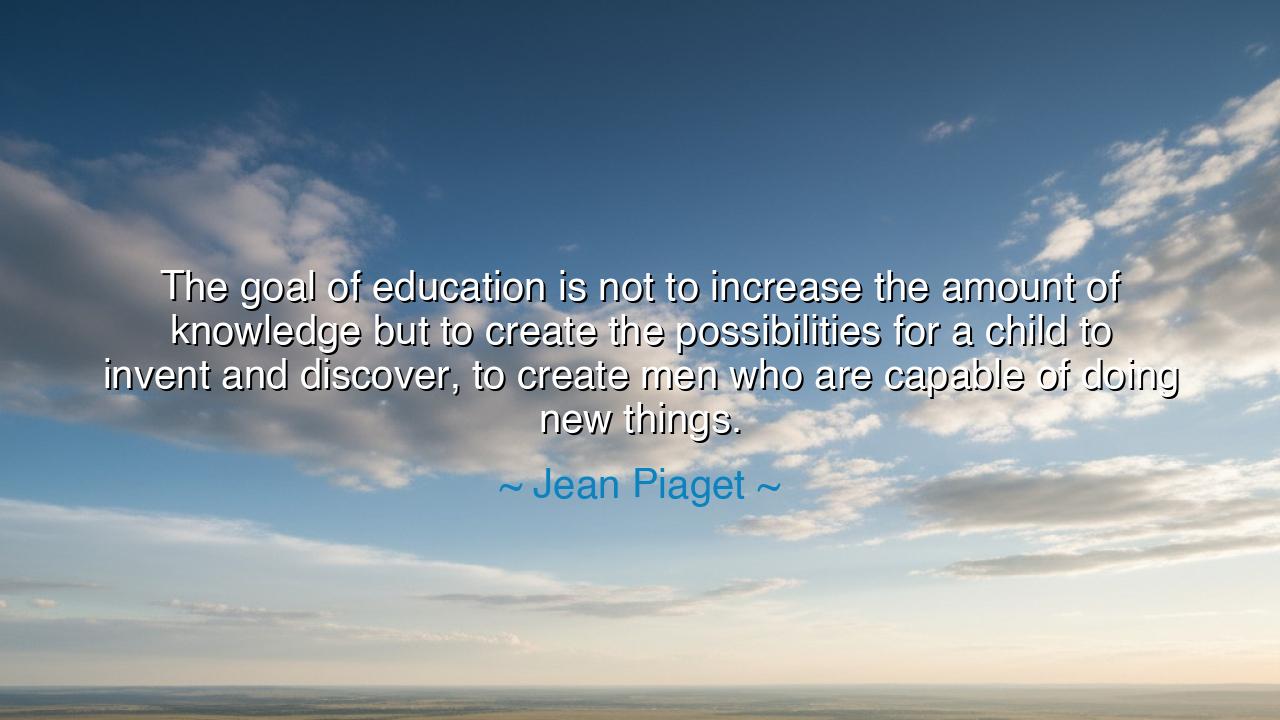
The goal of education is not to increase the amount of knowledge
The goal of education is not to increase the amount of knowledge but to create the possibilities for a child to invent and discover, to create men who are capable of doing new things.






"The goal of education is not to increase the amount of knowledge but to create the possibilities for a child to invent and discover, to create men who are capable of doing new things." These words of Jean Piaget, the great Swiss psychologist and pioneer of developmental learning, echo like a call to the teachers and thinkers of all ages. In them lies a truth as old as wisdom itself: that the purpose of education is not to fill the mind, but to awaken it. Piaget saw that knowledge is not a vessel to be poured into the young, but a fire that must be kindled—an inner flame of curiosity, imagination, and courage. His words challenge every generation to look beyond memorization, beyond the sterile counting of facts, and to nurture the sacred art of discovery.
Piaget’s insight was born from a lifetime of observing how children learn—not by passively absorbing information, but by experimenting, questioning, and playing. He saw that a child’s mind is not an empty slate, but a living organism, full of energy and potential. Through exploration, error, and wonder, the child constructs understanding for himself. Thus, the true teacher is not a lecturer, but a guide—one who prepares the soil and provides the tools, yet allows the student to grow in his own way. Piaget’s vision stands as a rebuke to all systems of education that value conformity over creativity, and memorization over mastery. For he knew that a world built only on imitation will soon decay; but a world that dares to invent will live forever.
The ancients, too, knew this truth. Socrates, who walked the streets of Athens asking questions rather than giving answers, practiced what Piaget would one day teach in scientific language. He understood that knowledge forced upon the mind is fleeting, but knowledge discovered is eternal. By leading his students to think for themselves, he made them builders of their own understanding. This is the essence of Piaget’s wisdom: that the goal of education is not to produce followers of knowledge, but creators of it—men and women who can shape the future rather than merely repeat the past.
We see this power of discovery shining through the story of Thomas Edison, who, as a boy, was labeled “slow” by his teachers and sent home. Yet his mother refused to let the world define him by its narrow standards of intelligence. She educated him not by command, but by curiosity—allowing him to experiment, to fail, and to learn through his own hands. From this freedom was born one of history’s greatest inventors, a man who gave the world light itself. Edison’s journey proves Piaget’s truth: that when a child is taught to invent rather than obey, to question rather than memorize, he becomes capable of doing new things—things that change the course of humankind.
Yet how many schools, even in our modern age, have forgotten this sacred mission? Too often, education becomes a prison of facts, a place where imagination is dulled and obedience is rewarded. The child who dreams is silenced; the one who memorizes is praised. We prepare our young to pass tests, not to face life. Piaget’s warning resounds through the centuries: if we educate without nurturing invention, we raise a generation skilled in imitation but poor in spirit. The world does not need more record-keepers of old ideas—it needs creators, thinkers who dare to see differently.
True education, therefore, is an act of liberation. It gives a child not answers, but the confidence to seek them. It replaces fear with wonder, dependence with initiative. It teaches him to trust his curiosity, to embrace failure as part of discovery. The wise teacher does not ask, “How much does my student know?” but rather, “How much can my student imagine?” For from imagination springs innovation, and from innovation springs the evolution of civilization itself.
Let this teaching be carried forward, as a flame passed from hand to hand: Educate to create. Teach your children not merely what to think, but how to think, how to question, how to build. Encourage them to test, to dream, to challenge the impossible. For it is not the learned who shape the ages, but the learners—those who never stop inventing new ways of seeing the world. As Jean Piaget taught, the future belongs not to those who have gathered the most knowledge, but to those whose education has taught them to discover anew the endless possibilities of the human mind.






AAdministratorAdministrator
Welcome, honored guests. Please leave a comment, we will respond soon